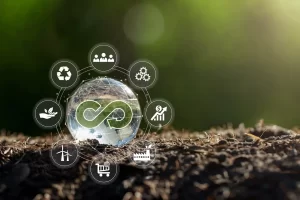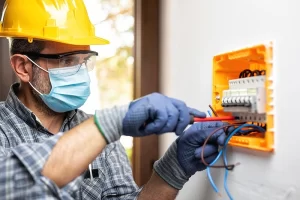Adopting circular economy practices as a freelancer enhances sustainable growth and demonstrates environmental and economic contributions. By embracing circular strategies, professionals can reduce waste, enhance reputation, and attract eco-conscious clients. These practices prioritize resource efficiency, waste reduction, and eco-friendly initiatives, positioning freelancers as innovative thinkers in a sustainable economy. The influence of circular economy principles on freelancer sustainability is substantial, leading to enduring viability and economic stability. For deeper insights on circular economy models overview and strategies tailored for freelancers, delve into the comprehensive research findings provided above.
Key Takeaways
- Circular economy models optimize resource use and reduce waste.
- Freelancers benefit from eco-friendly practices and sustainable growth opportunities.
- Implement circular practices to enhance reputation and attract eco-conscious clients.
- Focus on waste reduction, resource efficiency, and professional sustainability.
- Embrace circular economy strategies for long-term viability and competitiveness.
Understanding Circular Economy Models
In the domain of sustainable business practices, a deep understanding of Circular Economy Models is vital to promoting creative and strategic growth opportunities. By embracing these models, businesses can optimize resource utilization, reduce waste, and improve overall efficiency. This shift towards circularity promotes innovation, resilience, and competitive advantage in the market. Understanding the principles and applications of Circular Economy Models is important for companies striving for long-term success and sustainability.
Benefits of Circular Economy for Freelancers
The benefits of embracing circular economy practices for freelancers are significant. By adopting eco-friendly practices, freelancers can reduce waste, minimize environmental impact, and contribute to a more sustainable economy. This shift presents freelancers with new opportunities to align their work with circular economy principles and encourage a more responsible approach to their professional endeavors.
Freelancer Eco-friendly Practices
Exploring the symbiotic relationship between freelancers and circular economy practices unveils a realm of sustainable opportunities and eco-conscious solutions. By adopting eco-friendly practices like minimizing waste, reusing resources, and recycling materials, freelancers can reduce their environmental footprint while enhancing their brand reputation. Embracing circular economy principles not only benefits the planet but attracts clients who value sustainability, nurturing a sense of belonging in a community committed to positive change.
Circular Economy Opportunities
Freelancers can take advantage of a range of benefits by actively engaging in circular economy practices, opening up new avenues for sustainable growth and competitive advantage. By embracing circular economy principles, freelancers can reduce waste, lower costs, boost their reputation, and attract eco-conscious clients. This strategic shift towards sustainability not only benefits the environment but also positions freelancers as forward-thinkers in their industry.
Implementing Circular Practices as a Freelancer
Incorporating circular practices as a freelancer can significantly boost sustainability efforts within your professional endeavors. By embracing practices such as waste reduction, resource efficiency, and product longevity, freelancers can contribute to a more sustainable economy. Implementing circular strategies not only benefits the environment but also amplifies the reputation and competitiveness of freelancers in the growing market focused on sustainable solutions.
Circular Economy Strategies for Sustainable Growth
In considering Loop Economy Strategies for Sustainable Growth, it is vital to focus on developing sustainable growth strategies that align with circular economy principles. The implementation of circular practices can significantly impact freelancers, offering new opportunities for innovation and efficiency. Understanding the interconnectedness of sustainable growth, loop economy implementation, and the effects on freelancers is key to nurturing a more sustainable and prosperous future.
Sustainable Growth Strategies
To promote sustainable growth, businesses must strategically adopt circular economy models that prioritize resource efficiency and waste reduction. By implementing strategies such as product life extension, resource recovery, and eco-design principles, companies can minimize environmental impact while improving profitability. Embracing sustainable growth practices not only improves business reputation but also nurtures a sense of belonging within the community of environmentally conscious consumers and stakeholders.
Circular Economy Implementation
Implementing circular economy strategies is pivotal for businesses aiming to achieve sustainable growth through resource efficiency and waste reduction. By adopting practices such as product life extension, sharing platforms, and waste-to-resource initiatives, companies can minimize their environmental impact while maximizing economic benefits. This shift towards circularity not only improves operational efficiency but also nurtures a more sustainable and resilient business model for the future.
Impact on Freelancers
Embracing circular economy strategies can significantly impact freelancers by promoting sustainable growth and enhancing their economic opportunities. By encouraging resource efficiency, waste reduction, and product longevity, freelancers can adopt practices that align with circular economy principles. This shift not only benefits the environment but additionally opens up new avenues for freelancers to thrive in a more sustainable and resilient economy.
Circular Economy Impact on Freelancer Sustainability
Exploring the symbiotic relationship between loop economy principles and the sustainability of independent contractors reveals a dynamic scenery of opportunities for growth and resilience in the modern workforce. By adopting circular economy practices, freelancers can improve their long-term viability, reduce waste, and contribute to a more sustainable future. This shift towards sustainability not just benefits individual freelancers but plays a vital role in shaping a more environmentally conscious and economically stable freelance scenery.
Circular Economy Case Studies in Freelancing
Round Resource Management Case Studies in Freelancing shed light on practical applications of sustainable business practices within the freelance sector, showcasing real-world examples of round resource management principles in action. These case studies highlight how freelancers can implement strategies such as waste reduction, resource optimization, and product refurbishment to contribute to a more sustainable and round economy, nurturing a sense of community and shared responsibility.

Tools for Embracing Circular Economy as a Freelancer
Using specialized software and digital platforms can greatly enhance a freelancer’s capacity to incorporate circular economy principles into their workflow and business practices. Tools like project management software with sustainability tracking features, online marketplaces for upcycled goods, and carbon footprint calculators can assist freelancers in making knowledgeable choices that align with circular economy goals. These tools empower freelancers to monitor, measure, and optimize their sustainability efforts effectively.
Overcoming Challenges in Circular Freelancing
Understanding the intricacies of sustainable practices in freelancing can present formidable obstacles that require creative solutions and strategic thinking.
- Balancing customer demands with sustainability goals
- Managing project timelines to integrate circular practices
- Educating customers on the benefits of circular economy principles
- Finding suppliers that align with sustainable values
- Implementing circular business models effectively
Measuring Success in Circular Economy Freelancing
Attaining best results in the domain of eco-friendly freelancing requires a careful approach to evaluating achievements within the circular economy framework. Success in circular economy freelancing can be measured through metrics like waste reduction, resource efficiency, and positive environmental impact. Tracking project outcomes, client satisfaction, and adherence to circular economy principles are crucial for evaluating performance and ensuring sustainable growth in this evolving freelance environment.
Future Trends in Circular Economy for Freelancers
As the environment of freelance work continues to evolve, it is vital for freelancers to stay ahead of the curve by embracing circular economy trends. By adopting sustainable practices and integrating circular economy principles into their work, freelancers can not only contribute to a more eco-friendly future but also tap into new growth opportunities. Understanding and capitalizing on the potential of circular economy initiatives can set freelancers apart in a competitive market while making a positive impact on the environment.
Freelancer Circular Economy Trends
Within the domain of independent work, accepting and adjusting to the developing Circular Economy Trends is becoming increasingly vital for sustainable growth and success.
- Embracing digital platforms for efficient resource sharing.
- Implementing a ‘pay-as-you-use’ model for services.
- Collaborating with other freelancers to reduce waste.
- Offering eco-friendly services to meet market demands.
- Participating in circular economy events and workshops for continuous learning.
Sustainable Practices Adoption
Sustainable Practices Adoption in the domain of freelance work is crucial for staying relevant and competitive in the evolving Circular Economy scenery. Implementing practices like reducing waste, recycling materials, and using eco-friendly resources can boost a freelancer’s reputation and attract clients seeking sustainable solutions. Embracing circular economy principles not only benefits the environment but also aligns with the growing demand for socially responsible business practices in today’s market.
Circular Economy Growth Opportunities
Exploring future trends within the freelance sector, opportunities for growth within the circular economy present a promising scenery for creative freelancers seeking sustainable practices integration.
- Embracing digital platforms for circular economy projects.
- Capitalizing on blockchain technology for transparent supply chains.
- Implementing AI for waste reduction and resource optimization.
- Collaborating with sustainable brands for circular partnerships.
- Engaging in circular design thinking workshops for inventive solutions.
Frequently Asked Questions
How Can Freelancers Contribute to the Circular Economy?
Freelancers can contribute to the circular economy by embracing sustainable practices like waste reduction, resource efficiency, and product redesign. Through creative approaches and collaboration, freelancers can minimize environmental impact, promote reuse, and support sustainable growth.
What Are Some Challenges Freelancers May Face When Implementing Circular Economy Practices?
Freelancers may face challenges when implementing circular economy practices, such as restricted access to resources, lack of knowledge or skills, opposition from clients, and the need for cooperative efforts. Overcoming these hurdles requires strategic planning and creative solutions.
Are There Specific Tools or Resources Available to Help Freelancers Embrace Circular Economy Principles?
Freelancers can utilize tools like circular economy guides, online platforms, and industry-specific resources to adopt sustainable practices. Collaborating with sustainability experts, attending webinars, and joining relevant communities can provide valuable insights and support in integrating circular economy principles into their work.
How Can Freelancers Measure Their Success in Implementing Circular Economy Practices?
Freelancers can measure success in implementing circular economy practices through tracking resource efficiency, waste reduction, and stakeholder engagement. Utilizing key performance indicators, such as carbon footprint reduction and material reuse rates, offers valuable insights for continuous improvement.
What Are Some Future Trends in the Circular Economy That Freelancers Should Be Aware Of?
To stay ahead, freelancers must anticipate circular economy trends. Key areas include increased focus on product-life extension, adoption of sharing platforms, emphasis on sustainable sourcing, and technological advancements like blockchain for transparency.
Conclusion
In e, embracing circular economy models as a freelancer offers a strategic approach to sustainable growth and environmental impact. By understanding the principles of circular economy and implementing creative strategies, freelancers can boost their productivity, competitiveness, and contribute to a more environmentally conscious economy. Overcoming challenges and measuring success in circular freelancing will be important for future trends in thi field. Embracing circular economy practices is not only beneficial for individual freelancers but for the larger economy and society as a whole.
You May Also Like:



